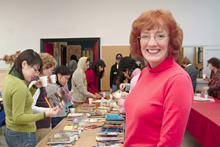Teaching English with books

Marlise Horst at Tyndale-St. George Community Centre during a break in a second-language English class for newcomers to the city.
Photo by Kate Hutchinson
Marlise Horst is fascinated by how people learning a second language build their vocabulary through reading, and she is making it her life’s work.
She first came to Concordia to pursue an MA in Applied Linguistics, graduating in 1993. Her PhD in the same field was conferred by the University of Wales in 2001; later that year she became an assistant professor of education at Concordia.
As a teacher and researcher in the Teaching English as a Second Language (TESL) Centre, she wants to understand how adult second-language learners become fluent readers in their new language.
Horst’s interest developed in Saudi Arabia and Oman, where she taught for over a decade.
“Students were coming into the university from little desert towns in Oman, and they really needed to know how to read English right away, to study commerce, medicine or engineering. They didn’t necessarily need to speak it; their need was to read English.
“That’s how my interest in reading and vocabulary came together. My first experiments were in my class there. I read out a whole novel, a simplified version of Thomas Hardy’s The Mayor of Casterbridge, and tested them on the words before and after.”
In 2004, Horst received a $93,000 three-year SSHRC grant to study “Developing Second Language Vocabulary Size and Speed Through Extensive Reading.”
She will examine literacy development using books designed for ESL learners. Some are literary classics, available with vocabulary adjusted for varying levels of proficiency.
“We assume that everybody learns new language through reading, but it is quite another thing to measure that. I’m working with new Canadians, some right off the plane, at the Tyndale-St. George Centre in Little Burgundy.”
The Centre is a joint mission of the Presbyterian and Anglican churches; Horst and her running group participate in an annual “Red Dress Run” on behalf of the charity, raising about $6,000 each year.
The simplified readers have been computer-scanned so their vocabulary is well defined. The learners are tested on a sample of this vocabulary before and after reading the books, to examine how well vocabulary is acquired from reading in context.
“Incidental pick-up is probably not as fast as if you were to actually study those words, look them up in the dictionary and think hard about them. However, it is important to know what happens incidentally because that is the main way we learn new words.
“Most of the time you don’t look them up in the dictionary or get told the meaning or get a chance to study them. You have to develop those contextual skills.”
Computer-based text-evaluation research reveals that “almost everything we say in normal conversation is within the 1,000 most common words of English. This ties in very closely with my research, because my partner at UQAM, Tom Cobb, makes websites for this very purpose, to help teachers all over the world identify common and unusual words in their teaching materials.” (Compleat Lexical Tutor, www.lextutor.ca)
Research shows the 1,000-word rule is also true of spoken French. Horst explained that fluent reading requires a much larger vocabulary: at least 3,000 words for English, 2,000 for French.
Why this discrepancy? Echoes of history, she said. “English started out as a Germanic language; basic words like ‘you’, ‘me’, ‘here’ and ‘there’ are Germanic in origin. The Norman Conquest in 1066 resulted in a lot of French vocabulary coming in.
As a result, “English has many, many words for the same thing. For the learner of English, there are a lot of synonyms to master. What is the difference between ‘kingly,’ ‘royal,’ ‘regal’ and ‘sovereign’? Mastering those nuances means learning both Germanic and Latin-based words, a problem learners of Romance languages don’t face to the same extent.”
Horst and colleagues Diane Schmitt at Nottingham Trent University in the UK and Tom Cobb of UQAM were recently awarded the TESOL International Research Funds grant for their project, “A comparison of computerized and traditional techniques for learning academic vocabulary.” TESL Centre colleagues Laura Collins and Joanna White won the award in 2002-3.
Wide World of TESL
This afternoon, TESL teachers are sharing stories from the field, from 4:15 to 5:45 in Room 531 of the Hall Bldg. The featured speaker is Valerie Markham, who has been teaching in China.